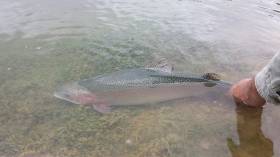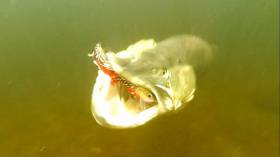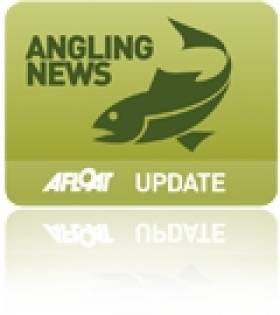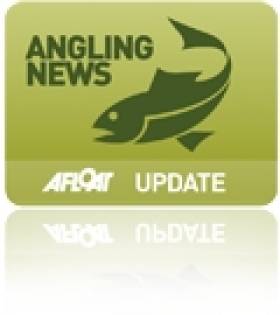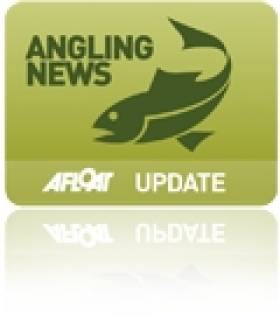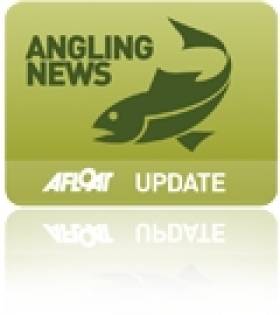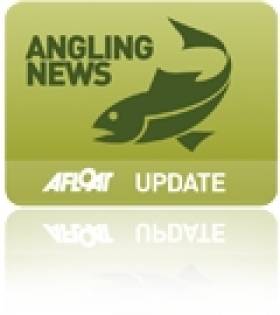Displaying items by tag: trout
Trout Takes On Salmon For Crown Of Ireland’s Fish Counters
#Seafood - A Howth-based seafood company is hoping to broaden Irish people’s taste for fish beyond the usual salmon, as TheJournal.ie reports.
Winners of the recent BIM National Seafood Award for Innovation in Seafood Processing, Oceanpath teamed up with Goatsbridge Trout Farm in Thomastown, Co Kilkenny seven years ago, seeing opportunity in an underdeveloped market for Irish trout.
The key, according to Oceanpath’s commercial director Ken Ecock, was to come up with a product that adhered to the same qualities that people expect from their salmon fillets: reasonably priced, easy to cook, and free of bones.
Supermarket promotions to demonstrate the taste, as well as quick and easy recipes and products such as smoked trout and even pate, have also helped the Irish public gradually come round to a homegrown fish that’s usually imported from elsewhere in Europe to our fish counters.
And as salmon prices rise over high demand and supply challenges, the trout option is growing ever more attractive for the Irish fish supper.
TheJournal.ie has more on the story HERE.
The Board of Inland Fisheries Ireland (IFI) met yesterday with a joint delegation from the National Anglers Representative Association and Trout Anglers Federation of Ireland to discuss IFI’s proposal to exit the production of trout for the re-stocking of angling lakes.
As a result of these discussions the Board of IFI has agreed to defer its proposal indefinitely. However, in the discussions the parties recognised that there are significant economic, environmental and biological issues surrounding the current production facilities which IFI needs to resolve. Inland Fisheries Ireland is committed to developing and seeking funding for a comprehensive strategy to meet current and future trout production needs, contingent on obtaining the significant investment required. The parties to the discussions agreed to continue to work closely together to deliver this strategy.
Review Of National Pike & Trout Policies
#Angling - Inland Fisheries Ireland (IFI) has today (Monday 4 July) published the indicative timetable for the review of the National Pike and Trout Policies.
Following the appointment of a Policy Review Group later this month, the review process will commence with a scoping consultation which will be open to all interested parties.
IFI says it has long recognised that public policy-making can be enhanced through the active involvement and contribution of all stakeholders and has set out how it will develop policies and consult with stakeholders in its IFI Procedure on Policy Development and IFI Stakeholder Consultation Policy.
It is expected that the updated National Pike and Trout Policy documents will be available a year from now in July 2017.
A policy group will be appointed shortly and will comprise of five IFI staff from the research, operations and business Development divisions.
“IFI is committed to consulting with stakeholders and the general public on matters of inland fisheries policy," said chief executive Dr Ciaran Byrne. "I expect the forthcoming scoping consultation process to gather useful information that will provide an evidence base for the update of the pike and trout policies in tandem.
“An agreed view from angler stakeholder groups would be most welcome and I urge the representative groups to work for such an outcome. I encourage all domestic and tourist anglers, tourism providers and the general public to provide their views on the important issues regarding the management of our important pike and trout species.”
The inland fisheries body acknowledges the upcoming protest being staged by pike interests and can confirm that no decision has been taken regarding the cessation or otherwise of pike management operations in designated trout waters for 2017.
IFI says it has accelerated the review of the policies and is working to ensure the completion of this exercise in as consultative way as possible that ensures all interested parties have input to policy formulation .
As advised previously, work continues within IFI regarding the examination of:
- The current stock management programme, including resource usage, fish transfer and health and safety.
- Marketing and socio-economic information to include actual and potential economic value.
- Scientific information to provide advice and to consider the scientific merits of the processes being currently undertaken.
The timeline for the review process is available to read or download HERE.
Ireland's Bass, Pike & Trout Policies Set For Review
#Angling - Inland Fisheries Ireland (IFI) has confirmed that it is in the process of reviewing the national policies for the management of bass, pike and trout.
The policies were launched by IFI in August 2014 and have a three-year review cycle.
IFI has commenced the process of examining all relevant and appropriate data to inform the review of these policies. This process was initiated in January 2016 and includes the examination of:
- The current stock management programme, including resource usage, fish transfer and health and safety.
- Marketing and socio-economic information to include actual and potential economic value.
- Scientific information to provide advice and to consider the scientific merits of the processes being currently undertaken.
An important element of each review will be a public consultation process which will be announced later in 2016. The consultations will ensure that anglers and other stakeholders have sufficient time to consider the existing policies and make submissions that will inform their review.
IFI chief executive Dr Ciaran Byrne said: “The public consultation element of the reviews presents an excellent opportunity for the 273,600-strong community of Irish anglers to engage with IFI and will ensure that the decision-making process becomes better informed, more rigorous and more accountable.
"IFI is committed to on-going engagement with anglers and other stakeholders through public meetings, the National Inland Fisheries Forum, public consultations and our complaints, comments and compliment procedures.”
During an anglers’ demonstration at IFI headquarters in Citywest on 24 March, IFI received a petition signed by over 22,000 people from around the world, including a total of 1,032 Irish signatures.
A group of approximately 80 anglers protested against the implementation of the current Pike Policy, agreed with the Irish Federation of Pike Angling Clubs and the National Association of Recreational Anglers in 2014.
Commenting on this, Dr Ciaran Byrne added: “While the petition represents a small proportion of Irish anglers, IFI recognises the unified views of those who signed it and we have made contact with the protest organisers with a view to engaging with this diverse group of anglers. IFI appreciates that public policy-making can be enhanced through the active involvement and contribution of all stakeholders with an interest in particular policy developments.
“In recent weeks, many of the protesters have made their views known to IFI through our comments and complaints channels but IFI wishes to assure all anglers that they will have the opportunity to make a representation in the public consultation process on the Pike, Trout and Bass Policy reviews later this year.
"Furthermore, IFI is running a number of surveys in conjunction with the ESRI to ensure that we capture the views of our domestic anglers as comprehensively as possible.”
Lough Sheelin Winter Angling? Not A Chance, Says Trout Protection Group
#Angling - Suggestions that Lough Sheelin may be kept open to all angling over the winter months have been criticised by the local trout protection association.
As Cavan's Anglo-Celt reports, Inland Fisheries Ireland (IFI) had proposed the idea of keeping the lake open beyond the end of the trout angling season, which closed last Monday 12 October, during discussions with clubs in recent months over new bye-laws for the Shannon Basin.
But Michael Callaghan of the Lough Sheelin Trout Protection Association says his group "would be totally opposed to it because we feel it would impinge on our trout stocks. While people might be targeting pike, they will catch trout."
Commenting at last weekend's season-closing trout event that attracted more than 240 anglers to the lake, Callaghan said proposed new bag and size limits were changes "we can live with" but winter angling has been proscribed in the area for more than 60 years.
"From our perspective, we don’t want to see any change in that," he added. "It would have an enormous negative impact on the wild trout population.”
The Anglo-Celt has more on the story HERE.
#Angling - Inland Fisheries Ireland (IFI) is seeking submissions from interested parties to update and amend existing Trout Bye-laws currently in operation in the Shannon River Basin District.
It is noted that the existing bye-laws in the Shannon catchment are for certain angling waters ambiguous and for others outdated.
IFI intends requesting the Minister for Agriculture, Food and the Marine to replace the existing bye-laws with more updated regulations that will better enable the management of these waters in a sustainable manner.
The key bye-laws to be replaced or restated and amended are numbers 787 (Lough Ree, 2003), 790 (Lough Sheelin, 2003) and 817 (River Shannon No 8 District, 2007).
The areas being considered for review are:
- To set the bag limit for wild brown trout on Loughs Owel, Ree, Derg and Sheelin to three fish per angler per day.
- To set the close season for Lough Owel, Ennell, Derravaragh and Ree from 1 October till the last day of February inclusive.
- To set the close season for Lough Derg from 1 October till 16 March inclusive.
- To amend the minimum size limits or introduce a bracket size of fish that can be taken by anglers on Loughs Owel, Ennell, Ree, Derg and Sheelin.
- Other amendments as required in line with best practice and following the submissions received.
IFI may, as part of the process, arrange a public consultation meeting if deemed necessary, but all submissions must be received in writing and will be published on the IFI website at www.fisheriesireland.ie.
Submissions may be sent by post to the Director, Inland Fisheries Ireland, Ashbourne Business Park, Dock Road, Limerick or by email to [email protected].
The closing date for receipt of submissions is at 5pm on Friday 17 April 2015.
#Angling - National policies for the management of trout, pike and bass, were launched today (Friday 22 August) by Inland Fisheries Ireland (IFI).
“These policies are the first national species policies to be issued from IFI and in this regard represent a new era for fisheries management in Ireland," said Brendan O'Mahony, chair of the State agency responsible for the protection, conservation, management and promotion of Ireland’s inland fisheries and sea angling resources.
"The policies will provide for the better conservation and management of bass, pike and trout in Ireland and will help ensure sustainability of stocks into the future," he added.
"In addition, they will allow for improved angling economic impacts and help to sustain and improve the many jobs that are supported by recreational angling in Ireland.”
The three policy documents have been formulated, through a rigorous consultation process, by groups comprising fisheries scientists, angling federations and industry representatives.
The recommendations will now be brought forward and put into practice by IFI. Where required, IFI will seek legislative changes to underpin and support the policies, which will be reviewed after a period of three years.
The main recommendations put forward include:
Bass: a reduction in the daily angling bag limit from two to one fish in any 24 hour period; an increase in the minimum landing size; and a review of the closed season.
Pike: in designated, managed wild brown trout fisheries, the current bye-law is recommended to be amended to prohibit the killing of any pike greater than or equal to 85 cm in length; all larger rod-caught pike should be returned to the water alive; in all other waters of the State an angler will be permitted to take and kill one pike of less than or equal to 50 cm in length (as per the existing bye-law); additionally, the policy calls for further research into pike movement and transfer programmes.
Trout: a national minimum size limit; national bag limits; designation of a number of lakes and rivers sections as wild brown trout fisheries; in addition to other measures.
IFI chief executive Dr Ciaran Byrne added: “I would like to thank all who assisted with the formulation of these policies, and I would also like to acknowledge the passion and understanding that all of the groups have for their species of interest: the environment; habitat; and pressures that they face.
"The challenge now is to implement these policies through the work of IFI, angling practices, and where necessary, with legislative support. I look forward to progressing these policies with the same collaborative approach as used in their formulation.”
For more information and to access the policy documents, visit www.fisheriesireland.ie.
Notice On 2014 Wild Salmon & Sea Trout Tagging Measures
#Angling - Fergus O'Dowd TD, Minister of State at the Department of Communications, Energy and Natural Resources, has given statutory notice of his proposal to revise the Wild Salmon and Sea Trout Tagging Scheme Regulations to apply from 1 January 2014.
The minister proposes to revoke the existing tagging scheme regulations and to make revised regulations to provide for commercial fishing and angling total allowable catches on an individual river basis.
The draft regulations are available HERE and open for public inspection. Any person may submit objections to the draft regulations at any time till 7 December 2013 either by email to [email protected] or in writing addressed to:
Inland Fisheries Division
Department of Communications Energy and Natural Resources
Elm House, Earlsvale Road,
Cavan
Lough Melvin Crowns Four-Time Open Trout Champ
#Angling - In Friday's Irish Times, Derek Evans reports from the Lough Melvin Open Trout Angling Championship last weekend, where Brian Uprichard took the title for the second year in a row, and the fourth time in total.
The Co Down angler teamed with fellow former champion Cecil Marshall from Sligo to qualify for the final with a four-fish haul, then seal the championship with "five good fish" - topping a field of nearly 300 anglers from throughout Ireland and beyond.
"On this my first visit to Garrison and Lough Melvin, I was taken aback by the warm welcome I received and the camaraderie among anglers both on and off the water," writes Evans. "The new clubhouse, officially opened earlier this year, meets all present-day requirements and is testimony to a hard-working committee."
As reported earlier this year on Afloat.ie, the Fermanagh lake has been bucking the trend of declining fish stocks in Northern Ireland's inland waterways, with a salmon surplus that can only add to the sport.
Elsewhere, Carrickmacross anglers had reason to celebrate at the recent NCFFI All-Ireland Angling Championships in Cavan.
As the Dundalk Democrat reports, members of the Carrickmacross Coarse Angling and Junior Development Club placed first and third in the senior competition of the junior angling event.
Jamie Edwards landed an impressive 9.9kg for his number-one spot while clubmate Lee Harris landed 7.12kg.
And in the women's competition, Carrick's Emma McMahon topped the scales with her catch.
Improving Life for Trout and Salmon on Lough Corrib’s Tributaries
#Angling - A recent collaboration between Inland Fisheries Ireland (IFI), angling clubs and private individuals with close links to Lough Corrib is helping to improve matters for trout and salmon stocks in the catchment area.
Over recent years, State funding has been decreasing for habitat improvement and stream rehabilitation work on salmonid spawning and nursery streams. Local angling clubs and concerned individuals have recognised this, and stepped in to assist with funding to ensure this vital work on such a crucial natural resource continues.
A joint initiative between Cairde Loch Coiribe and the Clydagh Foundation has sponsored spawning and nursery rehabilitation projects on a number of Corrib streams.
Cairde Loch Coiribe raises funds from various angling clubs around the lake through the Corrib Federation, while the Clydagh Foundation invests in enhancement projects on the Corrib spawning streams. IFI staff, who have years of expertise in this area, design and supervise the projects.
This important work enhances habitat for spawning adult trout and salmon, and increases the nursery ground available for young fish to grow and mature.
Electro-fishing surveys carried out by IFI before and after similar works have shown that juvenile fish stocks can be increased significantly by such enhancement. It is hoped that these juvenile fish will eventually grow and augment the stocks of fish available for game angling.
Local clubs including Kilbeg, Ballindiff, Headford and Collinamuck have assisted in the most recent projects in their respective areas. Enhancement projects for 2013 have been identified and it is hoped to commence in the coming months.
These projects complement ongoing works by the OPW’s Drainage Division, under its Environmental River Enhancement Programme. This programme is carried out through liaison with IFI to improve fish habitat on previously drained channels.
Tourism angling is a major part of the local economy around Lough Corrib, and it is expected that this work will have tangible economic benefits.



























